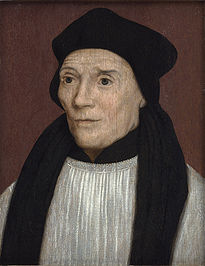 Writing in the (British) Catholic Herald, Francis Phillips claims that she “feels a shiver when I see the parallels between our world and that of St John Fisher”.
Writing in the (British) Catholic Herald, Francis Phillips claims that she “feels a shiver when I see the parallels between our world and that of St John Fisher”.
The context, inevitably, is of officialdom’s supposed attack on religious freedom in the UK. Fisher (1469-1535) is allegedly relevant because this English cardinal was eventually executed for refusing to go along with Henry VIII’s attempt to ensure that England should determine its own laws.
To Phillips, Fisher is a example to be praised, martyred because he would not go against his conscience. Oddly, she doesn’t mention another aspect of this sinister fanatic’s career, his role in the trial and execution of Thomas Hitton, the man often described as England’s first protestant martyr.
Thanks to Wikipedia (in this case, why not), we learn that George Joye (1495-1553) was not so reticent:
“And [Thomas] More amonge his other blasphemies in his Dialoge sayth that none of vs dare abyde by our fayth vnto deeth: but shortlye therafter/ god to proue More/ that he hath euer bene/ euen a false lyare/ gaue strength vnto his servaunte syr Thomas Hitton/ to confesse and that vnto the deeth the fayth of his holie sonne Iesus/ whiche Tomas the bishopes of Caunterburye & Rochester [Fisher]/ after they had dieted and tormented him secretlye murthered at Maydstone most cruellye.
Fisher was no defender of freedom of conscience. What he was defender of his conscience. And, indeed, enforcer of it on others. As for his fate, well, biter bit.
As I noted the other day, Fisher, and another of those responsible for Hitton’s execution, Thomas More, were recently drafted by New York’s Cardinal Dolan into the fight against the Obamacare contraception mandate in the name of religious freedom.
They were not, perhaps, the best of choices.
